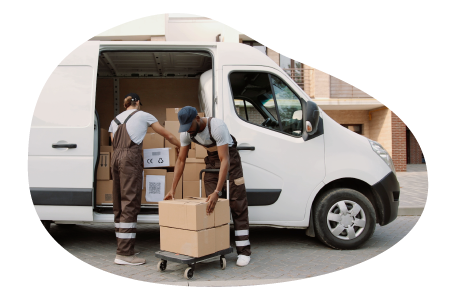
Auto insurance for delivery drivers and couriers
Because of delivery driving’s unique risks, commercial auto coverage is becoming less of a supplementary option and more of a necessary requirement. Insureon is here to help you find and select the best fit policy for your unique commercial auto needs.
Why delivery drivers and couriers need auto insurance
Every state requires drivers to buy a personal auto insurance policy for their vehicle, or to have the means of paying for their financial liabilities if they’re at fault for an accident.
Most states also require commercial auto insurance for businesses that own vehicles, with certain amounts of coverage needed for bodily injury liability and property damage liability.
Going without auto liability coverage can result in penalties from your state, and a possible loss of driving privileges. It also leaves you vulnerable to tremendous financial losses if you’re involved in an accident.
If you use your own car for work, your personal auto insurance probably won’t cover you in the event of an accident. It’s a good idea to check your car insurance policy to make sure you’re financially and legally protected for the business use of your vehicle, in case of an insurance claim.
Whether you run a courier service, delivery service, or are an independent food delivery driver (e.g., DoorDash, Grubhub, Postmates, Uber Eats, pizza delivery, Lyft, etc.) you need to make sure you’re financially protected beyond your personal car insurance, which most likely doesn’t include food delivery or rideshare coverage.
It's worth asking your insurance provider if you can get rideshare insurance, courier insurance, or on-demand delivery insurance as an add-on to your personal auto policy. This may increase your insurance premium, but it'll cost less than buying a business auto policy.
How to get commercial auto insurance
Are we a drama free bakery? Umm...What? What drama?
Direct hit!
You never really know what will happen. (screaming)
I deliver pastries, and pastry-like items. All these cupcakes aren't going to deliver themselves.
Don't worry, you have commercial auto insurance. You're covered!
Who put that pole there?
Less drama, more treats! Get all the coverage your business needs by clicking this button.
Protection is peace of mind...and a piece of cake.
What our customers are saying
Why is car insurance for delivery drivers so important?
Each state has different fines and fees for drivers and delivery companies who fail to insure their vehicles. For instance, in New York, uninsured drivers could see a fine of up to $1,500, and also have their driver's license and vehicle registration revoked for a year if they're involved in an accident.
Find commercial auto insurance requirements in your state


Which type of commercial car insurance is right for a delivery driver?
Commercial auto insurance or hired and non-owned auto insurance (HNOA) may be right for your business, especially as carriers expand these policies to cover drivers for rideshare companies and delivery platforms. The policy that is best for you depends on who owns the vehicle that requires coverage and how it’s used in everyday operations.
Commercial auto insurance
Commercial auto insurance coverage provides liability protection when drivers get into an accident in a company-owned vehicle. It can pay for any property damage or physical injuries that a driver causes, plus related legal expenses. It can also cover medical expenses if a driver is injured in an accident.
Commercial auto insurance doesn't provide coverage for drivers involved in an accident while driving their personal vehicles. In that situation, a hired and non-owned auto insurance policy would provide coverage for the driver.
Hired and non-owned auto insurance
Hired and non-owned auto insurance covers accidents that occur in personal vehicles used for work. It would cover a full-time employee driving their own car for a work errand, or an independent contractor driving for Amazon or Lyft. This coverage can also apply to vehicles a business rents or leases.
You should consider HNOA coverage if a rideshare or delivery company offers limited coverage, or leaves you on the hook entirely for your own insurance. Ask an insurance agent if you’re unsure which coverage you need.
How much does commercial auto insurance cost for delivery drivers and couriers?

Commercial auto insurance rates are based on a number of factors, including:
- Number of vehicles
- Vehicle type and value
- Level of risk involved
- Claims history
- Employee driving records
- Policy limits and deductible
Commercial auto insurance costs an average of $147 per month. 37% of Insureon small business customers pay less than $100 per month for their policies.
Which delivery driver services should be covered by commercial auto insurance?

You may need to have commercial auto insurance if your business involves:
- Commercial trucks or company-owned vehicles (e.g., box trucks, dump trucks, etc.)
- Long-haul trucking and freight services
- Transportation and delivery of goods
If your company owns semi-trucks and delivery trucks, then you will be required to have commercial auto coverage that meets your state’s requirements for liability insurance. If your business operates within your state, you might need less coverage than someone who hauls freight across multiple states.
Insurance for these delivery driving services can be more difficult to obtain, or more expensive than expected, because of the unique risks associated with the profession. These risks can include:
- Young or inexperienced drivers
- High driver turnover
- Reckless driving caused by pressure to deliver quickly
It is important to have commercial auto insurance for your delivery drivers in order to prevent your business from being exposed in the event that a driver gets into an accident.
What other types of insurance do delivery drivers and couriers need?
In addition to commercial auto insurance coverage and HNOA insurance, there are a few other types of business insurance that provide financial protection for those in the rideshare and delivery service fields.
General liability insurance
If you operate your delivery or courier business out of your home, your renter’s or homeowner’s insurance probably doesn’t provide coverage if a customer is injured on your property. General liability insurance offers financial protection from third-party accidents and lawsuits.
Commercial property insurance
If you own or rent your business space, or if you have expensive vehicles and equipment on site, commercial property insurance would insure your workplace and business assets. This includes covering the cost of repair or replacement if your property is stolen or damaged.
Commercial property insurance is often required by landlords to sign a lease.
Business owner’s policy
A business owner’s policy (BOP) combines general liability coverage and commercial property insurance in one policy. It's usually less expensive than buying each type of coverage separately.
Workers’ compensation
Workers' compensation insurance covers medical costs and lost wages for those dealing with a work-related injury or illness. Most states require workers' comp for any business that has at least one employee.
Those who are self-employed and don’t have employees generally aren’t required to purchase workers compensation insurance, but many of them still buy this coverage to either to fulfill a contract, or for the financial protection it provides.
Save money by comparing quotes with Insureon
Complete Insureon’s easy online application today to compare quotes for rideshare and courier insurance policies from top-rated U.S. companies. Once you find the right policy for your small business, you can begin coverage in less than 24 hours.
